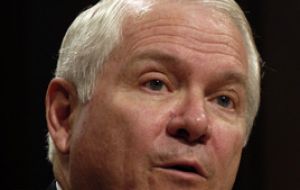MercoPress. South Atlantic News Agency
Iran efforts in Latinamerica concern US Defence Dpt.
 Gates tempted to invite the Russian fleet to Miami
Gates tempted to invite the Russian fleet to Miami United States Defence Secretary Robert Gates told Senators that although much attention was given to Russia's recent courting of some Latin American countries he is more concerned about new activities of Iran in the region.
Addressing the Senate Armed Services Committee Secretary Gates said he is worried about efforts by the Iranian government to gain influence in Latin America. "I'm concerned about the level of, frankly, subversive activity the Iranians are carrying on in a number of places in Latin America, particularly South America and Central America," said Secretary Gates. "They're opening a lot of offices and a lot of fronts behind which they interfere with what is going on in some of these countries." Other countries, including Russia and China, have also stepped up their presence in Latin America, where the United States has historically had the biggest influence. Russia caused concern to the region last November when it sent a fleet of ships to conduct joint naval exercises with Venezuela. In December, a Russian destroyer also passed through the Panama Canal for the first time since World War II. Still, Gates says a plunge in the world's oil prices has severely curbed Russia's income and its ability to build up its navy. "At 40 dollar oil the Russian navy does not bother me very much," said Gates. "This is the first time they've had an out of area exercise in a decade or so; it's important for us to keep perspective about their capabilities." Russia has had a tense relationship with the West since its troops invaded Georgia in August. Gates says the United States is taking Russian activity in Latin America in stride. "I felt that our best response to the Russian ship visits to Venezuela was nonchalance," he said. "In fact, if it hadn't been for the events in Georgia in August, I probably would've tried to persuade the president to invite the Russian ships to pay a port call in Miami, because I think they would've had a lot better time than they did in Caracas." Russian officials denied that the manoeuvres were meant to provoke the United States. President Dimitri Medevedev and Venezuelan President Hugo Chavez defended cooperative agreements they signed in November, saying they would help to create a "multi-polar" world that is not dominated by a single power. Meanwhile on Wednesday President Raul Castro began the first visit to Russia by a Cuban leader since the end of the Cold War. "From this visit, we hope to strengthen and consolidate what we have already achieved together, and it is necessary to make one more step in this direction," Castro said in an interview shown on Russia's state-run Vesti 24 television channel. Russian Foreign Minister Sergei Lavrov said Russia and Cuba plan to sign a number of agreements to promote cooperation in trade, economic, financial, investment, cultural and humanitarian areas. Lavrov said Russia's interest in Cuba is economic, underlining its changing role in the island from an ideological partner to one of trade.




Top Comments
Disclaimer & comment rulesCommenting for this story is now closed.
If you have a Facebook account, become a fan and comment on our Facebook Page!